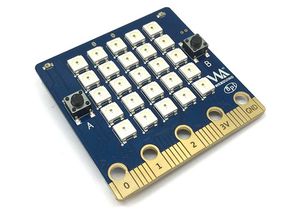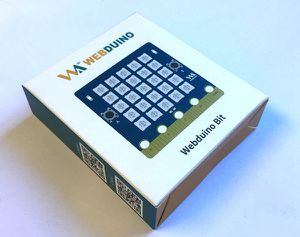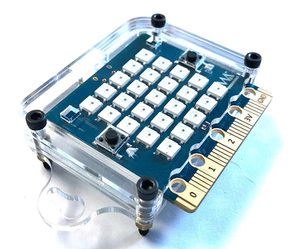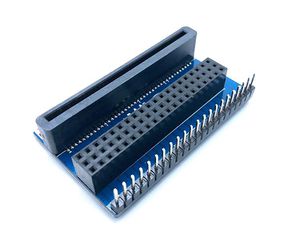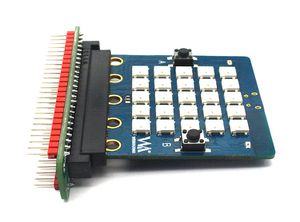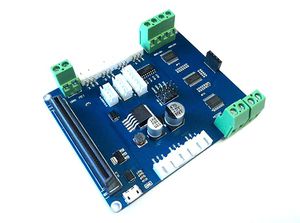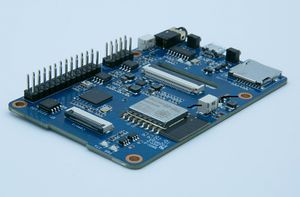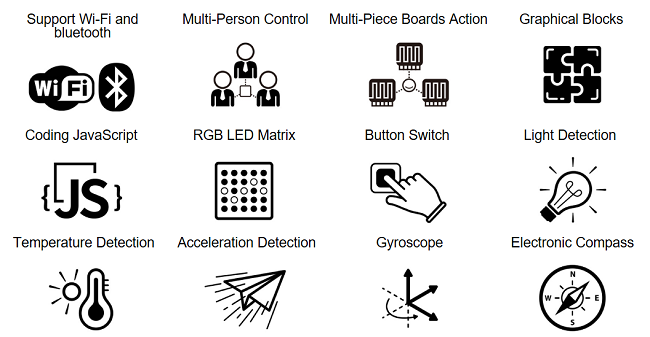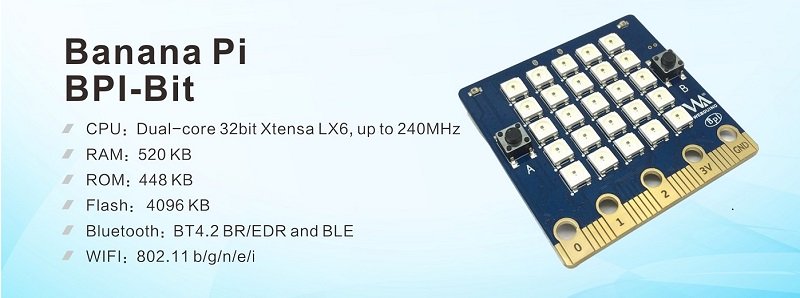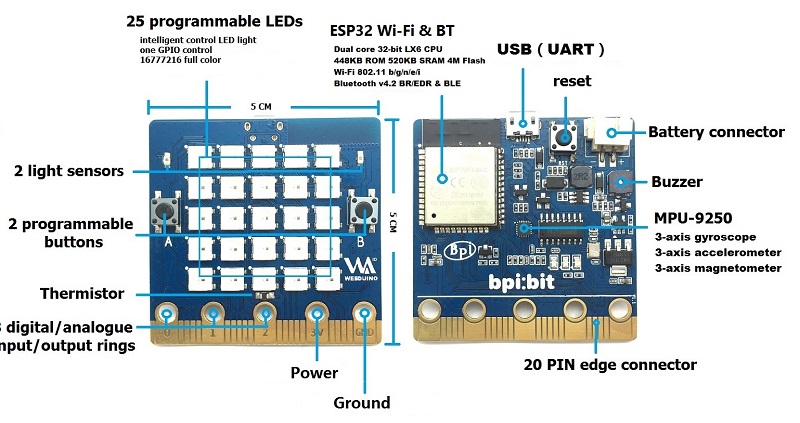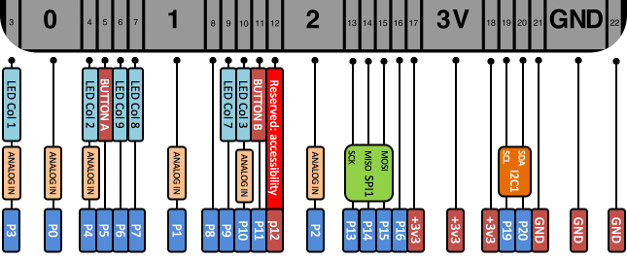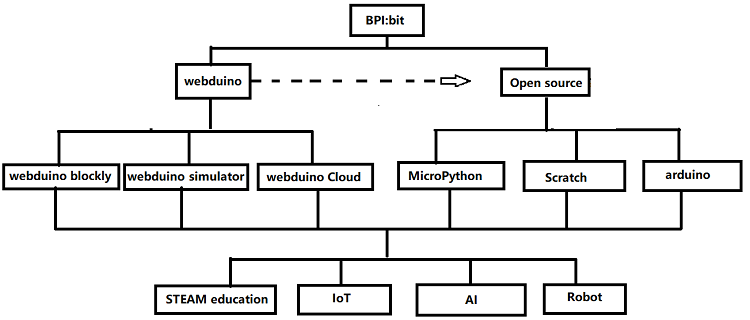Difference between revisions of "BPI-Bit"
(→Resources) |
|||
| (185 intermediate revisions by 5 users not shown) | |||
| Line 1: | Line 1: | ||
| − | + | [[zh:BPI-Bit STEAM 教育开发板]] | |
= Introduction= | = Introduction= | ||
| − | [[File:Webduino_gif.gif|thumb| | + | [[File:Webduino_gif.gif|thumb|[[BPI-Bit]] with ESP32]] |
| + | [[File:Bpi_bit_v2_1.jpg|thumb|[[BPI-Bit V2]] with ESP32-S2]] | ||
| + | [[File:Leaf-S3-incline-front.jpg|thumb|[[BPI-Leaf-S3]] with ESP32-S3]] | ||
| + | [[File:BPI-Centi-S3_2.jpg|thumb|[[BPI-Centi-S3]] with ESP32-S3 front]] | ||
| + | [[File:BPI-AI_1.JPG|thumb|[[BPI-AI]] Kendryte K210 RISC-V]] | ||
| + | [[File:ESP32_6.JPG|thumb|[[BPI-UNO32]] with ESP32 design]] | ||
[[File:Webduino_bit_1.JPG|thumb|Overview: BPI:bit]] | [[File:Webduino_bit_1.JPG|thumb|Overview: BPI:bit]] | ||
[[File:BPi_bit_webduino_3.jpg|thumb|Overview: BPI:bit for Webduino]] | [[File:BPi_bit_webduino_3.jpg|thumb|Overview: BPI:bit for Webduino]] | ||
[[File:BPI_bit_acrylic_shell_1_.JPG|thumb|[[BPI-bit acrylic shell compatible LEGO bricks]]]] | [[File:BPI_bit_acrylic_shell_1_.JPG|thumb|[[BPI-bit acrylic shell compatible LEGO bricks]]]] | ||
| − | [[File: | + | [[File:Bpi_bit_gpio_expansion_board_2.JPG|thumb|[[BPI:bit gpio expansion board]]]] |
| + | [[File:BPIbit_breadboard_GPIO_expansion_board_3.jpg|thumb|[[BPI:bit gpio expansion board]]]] | ||
| + | [[File:BPI-bit_robort_board_3.JPG|thumb|[[BPI:bit robot expansion board]]]] | ||
| + | [[File:Q-Car_With_Web_Bit.png|thumb|[[BPI Q-Car kit]] with BPI:Bit board]] | ||
| + | |||
| + | [[File:Banana_PI_BPI-EAI80_5.JPG|thumb|[[BPI-EAI80 AI board]] Gree EAI80 chip design]] | ||
| + | |||
| + | [[File:BPI-K210_1.JPG|thumb|[[BPI-K210 RISC-V AIoT board]]]] | ||
| + | |||
The '''BPI bit''' (also referred to as '''BPI-bit''', stylised as '''bpi:bit''') is an ESP32 with 32-bit Xtensa LX6 dual-core processor based embedded system. It supports Webduino, Arduino, MicroPython as well as Scratch X programming environments. | The '''BPI bit''' (also referred to as '''BPI-bit''', stylised as '''bpi:bit''') is an ESP32 with 32-bit Xtensa LX6 dual-core processor based embedded system. It supports Webduino, Arduino, MicroPython as well as Scratch X programming environments. | ||
| + | |||
| + | [[File:BPI-STEAM_750.jpg]] | ||
BPI:bit hardware main function: | BPI:bit hardware main function: | ||
| Line 14: | Line 29: | ||
[[File:Webduino_web_en_1.png]] | [[File:Webduino_web_en_1.png]] | ||
| − | bpi:bit board is 5 cm x 5 cm in size, weighs 10 ~ 12 grams, it houses a 20-Pin edge connector, built-in lighting matrix with 25 programmable full-color LEDs , two photosensitive light sensors, two programmable buttons, an NTC resistor, a buzzer and a nine shaft sensor (triaxial acceleration Three-axis gyroscope and three-axis magnetic compass), | + | bpi:bit board is 5 cm x 5 cm in size, weighs 10 ~ 12 grams, it houses a 20-Pin edge connector, built-in lighting matrix with 25 programmable full-color LEDs , two photosensitive light sensors, two programmable buttons, an NTC resistor, a buzzer and a nine shaft sensor (triaxial acceleration Three-axis gyroscope and three-axis magnetic compass), |
| + | the I/O space configuration is as follows: | ||
*Full color LED matrix: GPIO4 | *Full color LED matrix: GPIO4 | ||
*Photosensitive sensor: GPIO36 (Analog A0, upper left), GPIO39 (Analog A3, upper right) | *Photosensitive sensor: GPIO36 (Analog A0, upper left), GPIO39 (Analog A3, upper right) | ||
| − | *Button switch : GPIO35 (A), GPIO27 (B) | + | *Button switch : GPIO35 (Botton A), GPIO27 (Botton B) |
*Temperature sensor: GPIO34 (Analog A6) | *Temperature sensor: GPIO34 (Analog A6) | ||
*Buzzer: GPIO25 | *Buzzer: GPIO25 | ||
| − | *MPU-9250 9-axis sensor: GPIO0, GPIO21, GPIO22 | + | *MPU-9250 9-axis sensor: GPIO0, GPIO21(SDA), GPIO22(SCL) |
| − | = | + | {| class="wikitable" |
| + | |- | ||
| + | | style="background: PaleTurquoise; color: black" colspan="4"| '''GPIO control of BPI:bit''' | ||
| + | |- | ||
| + | |Light Sensor(L) || GPIO 36|| Analog Input | ||
| + | |- | ||
| + | |Light Sensor(R)|| GPIO 39|| Analog Input | ||
| + | |- | ||
| + | |Botton A|| GPIO 35 ||Digital Input | ||
| + | |- | ||
| + | |Botton B|| GPIO 27|| Digital Input | ||
| + | |- | ||
| + | |Temperature Sensor|| GPIO 34 ||Analog Input | ||
| + | |- | ||
| + | |Buzzer|| GPIO 25 ||PWM(Digital Output) / Analog Output | ||
| + | |- | ||
| + | |RGB_LED|| GPIO 4 ||Digital Output | ||
| + | |- | ||
| + | |MPU9250_SCL|| GPIO 22 ||Digital Output | ||
| + | |- | ||
| + | |MPU9250_SDA|| GPIO 21|| Digital Output | ||
| + | |- | ||
| + | |MPU9250_INT|| GPIO 16 ||Digital Input | ||
| + | |- | ||
| + | |R_LED(SPI_SCK)|| GPIO 18 ||Digital Output | ||
| + | |- | ||
| + | |} | ||
| − | = | + | = Hardware= |
| − | + | ==Hardware description == | |
| − | + | Webduino Bit is the latest board of Webduino with much more sensors on top of its basic functions(Wi-Fi connection, muti-connectivity,multi-board...). It uses ESP32 module,one of the most efficient and stable chipset in the market, which has built-in 2.4G Wi-Fi and Bluetooth,448KB ROM,520KB SRAM,speed up to 600 DMIPS,and 40 nm technology. | |
| − | + | Webduion bit board has a compact size of 50mm x 50mm, weighs 10-12 grams.It has 20 pins at the bottom,25 full color LED array in the middle, two photo cells,two buttons, one thermistor,one buzzer,one 9-axis sensor(3-axis accelerometer,3-axis gyroscope and 3-axis magnetometer) | |
| − | + | [[File:A_BPI-Bit.jpg]] | |
| − | + | ==Hardware interface== | |
| − | + | [[File:BPI_bit_interfact.JPG]] | |
| − | |||
| − | [[File: | ||
==PIN definitions== | ==PIN definitions== | ||
The edge interface is much compatible with those of micro:bit. so you may able to use micro:bit accessories on bpi:bit | The edge interface is much compatible with those of micro:bit. so you may able to use micro:bit accessories on bpi:bit | ||
| + | |||
| + | [[File:Bpi_bit_gpio_detail-05.jpg]] | ||
{| class="wikitable" | {| class="wikitable" | ||
| Line 103: | Line 145: | ||
|} | |} | ||
| − | == 5*5 LED | + | == 5*5 25 LED== |
BPI:bit have 25 LEDs on board, it can be controlled with a single GPIO. | BPI:bit have 25 LEDs on board, it can be controlled with a single GPIO. | ||
{| class="wikitable" | {| class="wikitable" | ||
| Line 124: | Line 166: | ||
The 9-axis sensor, MPU9250, is placed on the BPI:bit board. and MPU9250 uses I2C 0x69 address. | The 9-axis sensor, MPU9250, is placed on the BPI:bit board. and MPU9250 uses I2C 0x69 address. | ||
| − | The 9-axis is the combination of 3 separate triple axis sensors. For more detailed information of this chip, click here [https://github.com/yelvlab/BPI-BIT/blob/master/doc/MPU-9250A-01-v1.1.pdf MPU 9250 datasheet] to view the datasheet. | + | The 9-axis is the combination of 3 separate triple axis sensors. For more detailed information of this chip, click here [https://github.com/yelvlab/BPI-BIT/blob/master/doc/MPU-9250A-01-v1.1.pdf MPU 9250 datasheet] to view the datasheet.\ |
| + | |||
| + | BPI-BIT MPU9250 Library and how to : https://github.com/BPI-STEAM/MPU9250 | ||
==BPI:bit power== | ==BPI:bit power== | ||
| Line 176: | Line 220: | ||
|} | |} | ||
| − | = Software = | + | =BPI:bit Software development= |
| − | BPI:bit | + | BPI:bit Software development schedule and support applications: |
[[File:BPI_bit_map_wiki.png]] | [[File:BPI_bit_map_wiki.png]] | ||
| − | == | + | == BPI:bit for Webduino == |
| − | |||
| − | |||
| − | |||
| − | |||
| − | |||
| − | |||
| − | |||
| − | |||
| − | |||
| − | |||
| − | |||
| − | |||
| − | |||
| − | |||
| − | |||
| − | + | [[BPI:bit for Webduino]] | |
| − | |||
| − | |||
| − | |||
| − | |||
| − | |||
| − | |||
| − | |||
| − | |||
| − | |||
| − | |||
| − | |||
| − | |||
| − | |||
| − | |||
| − | |||
| − | |||
| − | |||
| − | |||
| − | |||
| − | |||
| − | == | + | ==BPI:bit for Arduino == |
| − | |||
| − | |||
| − | |||
| − | + | [[BPI:bit for Arduino]] | |
| − | |||
| − | == | + | ==BPI:bit for MicroPyhton == |
| − | + | [[BPI:bit for MicroPython]] | |
| − | + | ==BPI:bit for Scratch== | |
| − | + | [[BPI:bit for Scratch]] | |
| − | BPI | + | ==BPI STEAM education website== |
| − | + | https://bpi-steam.com/ | |
| − | [[ | + | =Resources= |
| + | *[https://github.com/BPI-STEAM/BPI-BIT/blob/master/doc/BPI-bit_user_manual.pdf BPI:bit user manual] | ||
| + | *[https://github.com/BPI-STEAM/BPI-BIT/blob/master/doc/BPI-WEBDUINO-BIT-V1_4.pdf BPI:bit V1.4 schematic diagram] | ||
| + | *[https://github.com/BPI-STEAM/BPI-BIT/blob/master/doc/BPI-WEBDUINO-BIT-V1_2.pdf BPI:bit V1.2 schematic diagram] | ||
| + | *[http://forum.banana-pi.org/uploads/default/original/2X/0/0b86ccaeb565cdeef093164fd1ff837727ca2887.rar BPI:bit dxf file] | ||
| + | *[https://drive.google.com/file/d/1JoQqcHd12TBzTResew5SkeNFxlJ3BGL8/view?usp=sharing BPI:bit 3D design file] | ||
| + | *Bananna Pi BPI:bit hardware introduce:https://www.youtube.com/watch?v=QVnlGKTittw | ||
| + | *BPI:bit Webduino Easy How-To's Episode 1: Initial Setup : https://www.youtube.com/watch?v=23_a27N3_7k | ||
| + | *How to Program Esp32 with Arduino IDE with C++ : https://technicalustad.com/program-esp32-with-arduino-ide-with-c/ | ||
| + | *Banana Pi BPI:bit CE FCC RoHS Certification :http://forum.banana-pi.org/t/banana-pi-bpi-bit-ce-fcc-rohs-certification/7363 | ||
| + | *BPI:bit platformio official support :https://docs.platformio.org/en/latest/boards/espressif32/bpi-bit.html | ||
| + | *BPI:bit for webduino wuyu online documents(TaiWan): https://sites.google.com/site/wenyuwebbit/ | ||
| + | *BPI:bit for webduino chenlung document(TaiWan):https://sites.google.com/a/tssh.ntpc.edu.tw/chenlung/webduino-bit | ||
| − | == | + | ==Forum== |
| − | + | free discuss forum : http://forum.banana-pi.org/c/bpi-bit | |
| − | + | Books: | |
| − | * | + | *Plataforma STEAM Webduino. WEB:Bit manual para el aula.: Herramienta para el estudio de las Ciencias de la Computación en la Educación Primaria y Secundaria (Spanish Edition) Kindle Edition |
| + | ::https://www.amazon.com/gp/product/B0B4HNYBJ5/ref | ||
| − | == | + | ==Github== |
| − | + | *[https://github.com/webduinoio Webduino github] | |
| − | *[ | + | *[https://github.com/BPI-STEAM bpi:bit open soruce github] |
| − | + | *[https://doc.bpi-steam.com/en/latest/ BPI:bit for STEAM education online documents. Arduino,microPython,Webduino] | |
| − | *[ | + | *[https://github.com/espressif/arduino-esp32 ESP32 for arduino github] |
| − | * | + | *[https://github.com/alankrantas/micropython-BPIBIT alankrantas BPI:bit github] |
| − | + | ==test routine== | |
| − | + | *[[MPU9250 sample code]] | |
| − | == | + | ==Useful links== |
| − | + | *[https://github.com/BPI-STEAM/BPI-BIT/blob/master/doc/ESP32-datesheet_english.pdf ESP32 规格书] ESP32 datasheet] | |
| − | + | *[https://www.dfrobot.com/blog-964.html ESP32 Arduino Tutorial Overview] | |
| − | * | + | *[https://technicalustad.com/program-esp32-with-arduino-ide-with-c/?tdsourcetag=s_pcqq_aiomsg How to program ESP32 with arduino IDE with C++ ] |
| − | + | *[https://www.espressif.com/products/hardware/esp32/resources Espressif ESP32 Resources] | |
| − | + | *[https://esp-idf.readthedocs.io/en/latest/ Espressif ESP-IDF Programming Guide] | |
| − | + | *[http://www.invensense.com/wp-content/uploads/2015/02/PS-MPU-9250A-01-v1.1.pdf MPU9250 datasheet] | |
| − | + | *[https://github.com/BPI-STEAM/BPI-BIT/tree/master/doc More others] | |
| − | + | *[http://webduino.io Webduino official website] | |
| − | + | *[http://www.webduino.com.cn/site/en/ Webduino website in China] | |
| − | * | ||
| − | |||
| − | |||
| − | |||
| − | |||
| − | |||
| − | * | ||
| − | |||
| − | |||
| − | |||
| − | * | ||
| − | * | ||
| − | |||
| − | * | ||
| − | * | ||
| − | * | ||
| − | * | ||
*[https://pt.aliexpress.com/store/product/O-BPI-bit-Webduino-e-placa-arduino-com-educa-o-EPS32-para-VAPOR/302756_32861694375.html?spm=a2g03.12010611.0.0.203230d9sYXj5K Easy to buy bpi:bit sample form aliexpress ] | *[https://pt.aliexpress.com/store/product/O-BPI-bit-Webduino-e-placa-arduino-com-educa-o-EPS32-para-VAPOR/302756_32861694375.html?spm=a2g03.12010611.0.0.203230d9sYXj5K Easy to buy bpi:bit sample form aliexpress ] | ||
*[https://www.facebook.com/groups/1618158071553661 Facebook group ] | *[https://www.facebook.com/groups/1618158071553661 Facebook group ] | ||
| − | |||
| − | |||
| − | |||
| − | |||
| − | |||
| − | |||
| − | |||
| − | |||
| − | |||
| − | |||
Latest revision as of 01:48, 6 March 2023
Introduction
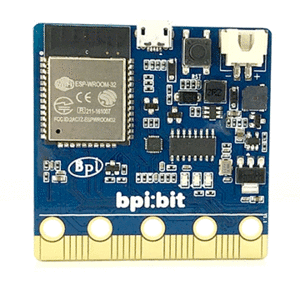
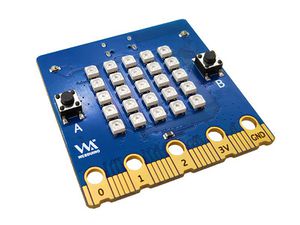
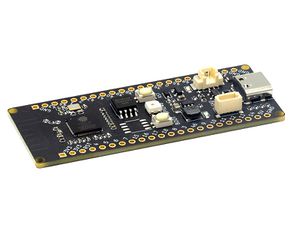
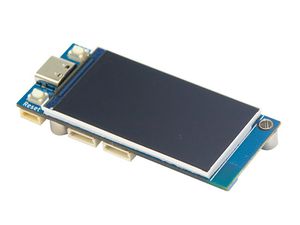
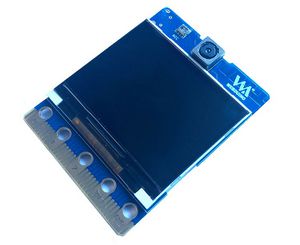
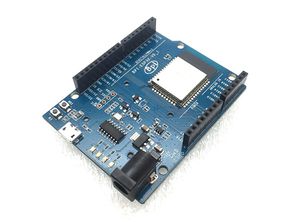
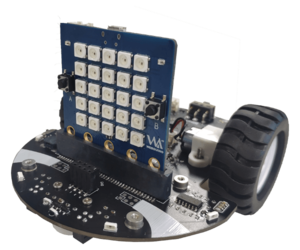
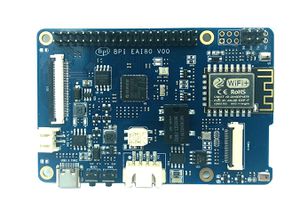
The BPI bit (also referred to as BPI-bit, stylised as bpi:bit) is an ESP32 with 32-bit Xtensa LX6 dual-core processor based embedded system. It supports Webduino, Arduino, MicroPython as well as Scratch X programming environments.
BPI:bit hardware main function:
bpi:bit board is 5 cm x 5 cm in size, weighs 10 ~ 12 grams, it houses a 20-Pin edge connector, built-in lighting matrix with 25 programmable full-color LEDs , two photosensitive light sensors, two programmable buttons, an NTC resistor, a buzzer and a nine shaft sensor (triaxial acceleration Three-axis gyroscope and three-axis magnetic compass),
the I/O space configuration is as follows:
- Full color LED matrix: GPIO4
- Photosensitive sensor: GPIO36 (Analog A0, upper left), GPIO39 (Analog A3, upper right)
- Button switch : GPIO35 (Botton A), GPIO27 (Botton B)
- Temperature sensor: GPIO34 (Analog A6)
- Buzzer: GPIO25
- MPU-9250 9-axis sensor: GPIO0, GPIO21(SDA), GPIO22(SCL)
| GPIO control of BPI:bit | |||
| Light Sensor(L) | GPIO 36 | Analog Input | |
| Light Sensor(R) | GPIO 39 | Analog Input | |
| Botton A | GPIO 35 | Digital Input | |
| Botton B | GPIO 27 | Digital Input | |
| Temperature Sensor | GPIO 34 | Analog Input | |
| Buzzer | GPIO 25 | PWM(Digital Output) / Analog Output | |
| RGB_LED | GPIO 4 | Digital Output | |
| MPU9250_SCL | GPIO 22 | Digital Output | |
| MPU9250_SDA | GPIO 21 | Digital Output | |
| MPU9250_INT | GPIO 16 | Digital Input | |
| R_LED(SPI_SCK) | GPIO 18 | Digital Output | |
Hardware
Hardware description
Webduino Bit is the latest board of Webduino with much more sensors on top of its basic functions(Wi-Fi connection, muti-connectivity,multi-board...). It uses ESP32 module,one of the most efficient and stable chipset in the market, which has built-in 2.4G Wi-Fi and Bluetooth,448KB ROM,520KB SRAM,speed up to 600 DMIPS,and 40 nm technology.
Webduion bit board has a compact size of 50mm x 50mm, weighs 10-12 grams.It has 20 pins at the bottom,25 full color LED array in the middle, two photo cells,two buttons, one thermistor,one buzzer,one 9-axis sensor(3-axis accelerometer,3-axis gyroscope and 3-axis magnetometer)
Hardware interface
PIN definitions
The edge interface is much compatible with those of micro:bit. so you may able to use micro:bit accessories on bpi:bit
| HardWare PIN define of BPI:bit | |||||
| Pin Name | Analog Function1 | Analog Function2 | Function1 | Function2 | Power |
| P3 | ADC2_CH4 | GPIO13 | |||
| P0 | ADC2_CH8 | DAC_1 | GPIO25 | ||
| P4 | ADC2_CH3 | GPIO16 | |||
| P5 | ADC1_CH7 | GPIO35 | |||
| P6 | ADC2_CH5 | GPIO12 | |||
| P7 | ADC2_CH6 | GPIO14 | |||
| P1 | ADC1_CH4 | GPIO32 | |||
| P8 | GPIO16 | ||||
| P9 | GPIO17 | ||||
| P10 | ADC2_CH9 | DAC_2 | GPIO26 | ||
| P11 | ADC2_CH7 | GPIO27 | |||
| P12 | ADC2_CH2 | GPIO02 | |||
| P2 | ADC1_CH5 | GPIO33 | |||
| P13 | GPIO18 | SPI_SS | |||
| P14 | GPIO19 | SPI_SCK | |||
| P15 | GPIO23 | SPI_MISO | |||
| P16 | GPIO05 | SPI_MOSI | |||
| 3V3 | POWER:3V3 | ||||
| 3V3 | POWER:3V3 | ||||
| 3V3 | POWER:3V3 | ||||
| P19 | GPIO22 | I2C_SCL | |||
| P20 | GPIO21 | I2C_SDA | |||
| GND | GROUND | ||||
| GND | GROUND | ||||
| GND | GROUND | ||||
5*5 25 LED
BPI:bit have 25 LEDs on board, it can be controlled with a single GPIO.
| 25 5*5 LED list of BPI:bit | ||||
| 20 | 15 | 10 | 5 | 0 |
| 21 | 16 | 11 | 6 | 1 |
| 22 | 17 | 12 | 7 | 2 |
| 23 | 18 | 13 | 8 | 3 |
| 24 | 19 | 14 | 9 | 4 |
MPU9250 9-axis sensor
The 9-axis sensor, MPU9250, is placed on the BPI:bit board. and MPU9250 uses I2C 0x69 address.
The 9-axis is the combination of 3 separate triple axis sensors. For more detailed information of this chip, click here MPU 9250 datasheet to view the datasheet.\
BPI-BIT MPU9250 Library and how to : https://github.com/BPI-STEAM/MPU9250
BPI:bit power
When you use BPI:bit, you need to supply the board first, and the bit supports three power supply modes
- 1.micro USB port:USB cable power supply, the design of BPI:bit board has Micro USB interface, which is quite common in daily life and is quite convenient to use.
- 2.Battery port:Through 2 pin battery power supply socket, can through the lithium battery, battery pack to power supply board, interface fool proof design, don't worry about the power supply through the 2 pin battery power supply socket, can through the lithium battery, battery pack to power supply board, interface fool proof design, don't have to worry about power supply meet the problem.
- 3.Goldfinger :Power is supplied through the gold finger, and the gold finger at the bottom of the board contains the power interface. Meanwhile, it has both input and output functions and has high compatibility.
BPI:bit VS micro:bit
| bpi:bit VS micro:bit | |||||||
| Module | bpi:bit | micro:bit | |||||
| CPU | Dual-core 32bit Xtensa LX6, up to 240MHz | NXP KL26Z 32bit ARM Cortex M0, up to 16MHz | |||||
| RAM | 520 KB | 16 KB | |||||
| ROM | 448 KB | Unkown | |||||
| Flash | 4096 KB | 256 KB | |||||
| Bluetooth | BT4.2 BR/EDR and BLE | BLE only | |||||
| WIFI | 802.11 b/g/n/e/i | N/A | |||||
| Buzzer | 1x Buzzer | N/A | |||||
| 5*5 LEDS | 25 intelligent-control full-color (16777216 color) LEDs, Cascading all LEDs by a single line. | 25 red LEDs | |||||
| photosensitive sensor | 2 light sensors | Basic light detection function on LEDs | |||||
| temperature sensor | Stand along temperature sensor | On CPU chip temperature sensor | |||||
| Motion sensor | MPU-9250 9-axis Motion Tracking : 3-axis accelerometer, 3-axis magnetometer, 3-axis gyroscope | 3-axis Accelerometer; 3-axis magnetometer; no gyroscope, no motion processor | |||||
| IO interface | edge interface (compatible with most micro:bit I/O features) | edge interface | |||||
| Button | 2 programmable buttons | 2 programmable buttons | |||||
| micro USB | 1x micro USB(UART) | 1 x micro USB(Mass Storage Device) | |||||
| Software | Webduino, Arduino, MicroPython, Scratch X | Microsoft MakeCode, MicroPython, Scratch X | |||||
| Size | 5*5 cm | 5*4 cm | |||||
BPI:bit Software development
BPI:bit Software development schedule and support applications:
BPI:bit for Webduino
BPI:bit for Arduino
BPI:bit for MicroPyhton
BPI:bit for Scratch
BPI STEAM education website
Resources
- BPI:bit user manual
- BPI:bit V1.4 schematic diagram
- BPI:bit V1.2 schematic diagram
- BPI:bit dxf file
- BPI:bit 3D design file
- Bananna Pi BPI:bit hardware introduce:https://www.youtube.com/watch?v=QVnlGKTittw
- BPI:bit Webduino Easy How-To's Episode 1: Initial Setup : https://www.youtube.com/watch?v=23_a27N3_7k
- How to Program Esp32 with Arduino IDE with C++ : https://technicalustad.com/program-esp32-with-arduino-ide-with-c/
- Banana Pi BPI:bit CE FCC RoHS Certification :http://forum.banana-pi.org/t/banana-pi-bpi-bit-ce-fcc-rohs-certification/7363
- BPI:bit platformio official support :https://docs.platformio.org/en/latest/boards/espressif32/bpi-bit.html
- BPI:bit for webduino wuyu online documents(TaiWan): https://sites.google.com/site/wenyuwebbit/
- BPI:bit for webduino chenlung document(TaiWan):https://sites.google.com/a/tssh.ntpc.edu.tw/chenlung/webduino-bit
Forum
free discuss forum : http://forum.banana-pi.org/c/bpi-bit
Books:
- Plataforma STEAM Webduino. WEB:Bit manual para el aula.: Herramienta para el estudio de las Ciencias de la Computación en la Educación Primaria y Secundaria (Spanish Edition) Kindle Edition
Github
test routine
Useful links
- ESP32 规格书 ESP32 datasheet]
- ESP32 Arduino Tutorial Overview
- How to program ESP32 with arduino IDE with C++
- Espressif ESP32 Resources
- Espressif ESP-IDF Programming Guide
- MPU9250 datasheet
- More others
- Webduino official website
- Webduino website in China
- Easy to buy bpi:bit sample form aliexpress
- Facebook group
